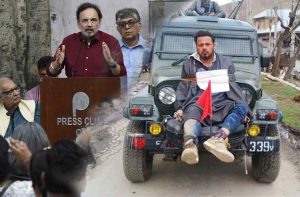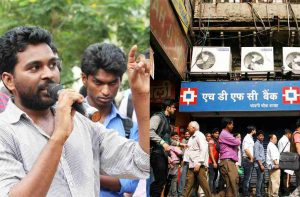~By Inderjit Badhwar
The Great Intolerance Debate which has consumed this country ever since the wildly popular Narendra Modi government swept the polls and established a throttlehold on the Dilli Durbar continues relentlessly. The language and people change, but the contours remain unaltered. In recent weeks and days, it has played out between supporters versus detractors of Army Chief Rawat’s use of a human shield in Kashmir; of the CBI’s raid at the premises of the owners of NDTV; of Sadhvi Saraswati openly telling an All India Hindu Convention that beef-eaters be publicly hanged.
Earlier, it was about ghar waapsi and love jehad, the suicide of Dalit student Rohith Vemula, the utterances of student activists at campus rallies, the hanging of Afzal Guru, Shah Rukh Khan’s TV comments on intolerance…. An overwhelming political victory had created public schisms rarely seen in Indian politics since the Babri Masjid and Mandal reservations controversies.
On the larger canvas, this is now playing out as a socio-political Armageddon, in which the hitherto splintered governing nationalists, mostly associated with hardline Hindutva, have formed a united front against the anti-nationals. These are actually vague terms subject to qualification and interpretations. Perhaps this is better understood when we view it from a simpler paradigm. Let’s call it Patriotism because it is easier to define: an intense love for one’s own country and a willingness to make sacrifices for its welfare.
Fair enough? If we accept this, we are still faced with the dilemma of fellow-countrymen calling one another unpatriotic because they cannot agree on what constitutes the national interest or who should define and protect it. Our Constitution is the safest and grandest arbiter for this quarrel, but constitutions, no matter how idealistically framed, also need to be amended to keep pace with changing social and political mores. Should a ruling political party, which is in reality a vested interest, be the sole interpreter of the national interest and those opposed to its definitions be dub-bed unpatriotic?

Is it patriotic to define a nation as a mere geographical entity and unpatriotic to characterise it as a comity of shared values and cultural beliefs? Is it unpatriotic to make a film on Rohith Vemula to illustrate the struggles of Dalit students to question a predominantly upper caste narrative of India and patriotic to censor it in order to prevent India from being shown in a bad light or to prevent provoking Dalit anger? Is it unpatriotic to reach out to Kashmir’s alienated youth in search of peace and patriotic to brand all Kashmiris as terrorists? Is it patriotic for the government to uphold the law by raiding a financially suspect media baron and unpatriotic to question the raid as a possible warning to the media as a whole to march lockstep with government diktats and policies? Is it patriotic for a government to suck 86 percent of the liquidity out of the market through overnight demonetisation of currency notes in order to curb black money and terrorist funding and unpatriotic to condemn this move as a political gimmick with concomitantly devastating effects on the poor?
In case you are confused about patriotism, as I seem to be, a good starting point to clear the cobwebs is Samuel Johnson, the awesome scholar who compiled the first English Dictionary. His biographer, Boswell, quoted Johnson as saying in 1775 that “Patriotism is the last refuge of scoundrels”. In what context he said this is not quite known. But it is generally accepted that those in political power are in the habit of draping themselves in the national flag to avoid public scrutiny of their misdoings or deliberate assaults on liberty. Johnson came close to saying this: “It is unpleasing to represent our affairs to our own disadvantage; yet it is necessary to show the evils which we desire to be removed.” Boswell, nonetheless states that Johnson was not indicting patriotism in general, only false patriotism.
Though Johnson was a lover of liberty, he was an obvious foe of demagoguery and populism. He observed that a person sometimes starts up a patriot “only by disseminating discontent, and propagating reports of secret influence, of dangerous counsels, of violated rights, and encroaching usurpation. This practice is no certain note of patriotism. To instigate the populace with rage beyond the provocation, is to suspend public happiness, if not to destroy it. He is no lover of his country that unnecessarily disturbs its peace. Few errors and few faults of government, can justify an appeal to the rabble; who ought not to judge of what they cannot understand, and whose opinions are not propagated by reason, but caught by contagion”.
The patriot versus anti-national slugfest is not peculiar to India. In America, its most recent manifestation was the political excommunication of Colin Kaepernick, possibly the greatest NFFL quarterback of all time. His sin was to have kneeled rather than stand when the national anthem was being played as a mark of his personal protest against dubious police shootings of black boys and men all over the US.
The American national anthem ends, “… for the land of the free and the home of the brave”. In the context of public protest, Steve Nelson, head of New York’s Calhoun School, asks: Who are the “free?” Who are the “brave?” Who are the real patriots?

In an article for Huffpost, Nelson recalls that the US was forged out of a deep longing for freedom and the bravery of colonists who sought liberty from the oppression of Eng-land. “In 1775, just the year before the Declaration of Independence, Massachusetts formed a government that proclaimed, perhaps for the first time, ‘God save the people,’ rather than ‘God save the King.’ The revolutionary movement’s refusal to mindlessly recite the mantra of authority of Great Bri-tain was an essential part of the establishment of the United States of America.” In this, there are great historical similarities with India.
The American Declaration of Independence, adopted a year later, stated in part:
Governments are instituted among Men, deriving their just powers from the consent of the governed, that whenever any Form of Government becomes destructive of these ends, it is the Right of the People to alter or to abolish it, and to institute new Government, laying its foundation on such principles and organizing its powers in such form, as to them shall seem most likely to affect their Safety and Happiness.
For black Americans, Nelson wrote, “the ensuing years have been anything but ‘free’. From slavery, and enforced segregation, through unequal education, through mass incarceration and the New Jim Crow, the promises of the United States of America have been diluted and withheld”.
He finds it deeply ironic that his nation is divided in this way: “The modern day loyalists, who have appropriated symbols of the original independence movement, are deeply angered by the refusal of black folks to honor the anthem or to pledge their unconditional allegiance to the government. The Trump campaign and its racist figurehead (were) most violently outraged by the resistance. Those symbols—the flag, the Star Spangled Banner, the Pledge of Allegiance, the ubiquitous ‘God Bless America’—once the anthems of freedom, are now the rallying cries of the oppressor. They are the contemporary iteration of ‘God Save the King.’”
I agree with Nelson that patriotism is not demonstrated by waving a flag: “Patriotism inhabits the Constitution and the Bill of Rights. Patriotism is demonstrated by the bravery of men, women and children who love the country enough to demand that it fulfill its overdue promises.”
I hark back to Johnson who notes that some call themselves patriots solely on the basis of “an acrimonious and unremitting opposition” to the court or government. This mark, he said, was by no means infallible. “Patriotism is not necessarily included in rebellion. A man may hate his king, yet not love his country.” Or in modern day India, a man may hate his government but still love his country.
—Inderjit Badhwar is Editor-in-Chief, India Legal.
He can be reached [email protected]


